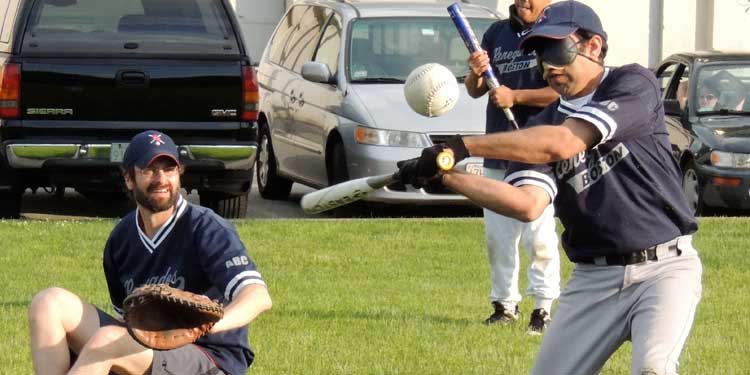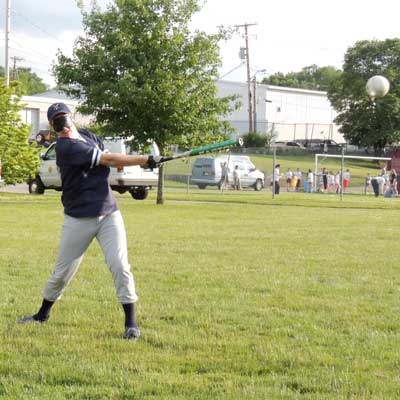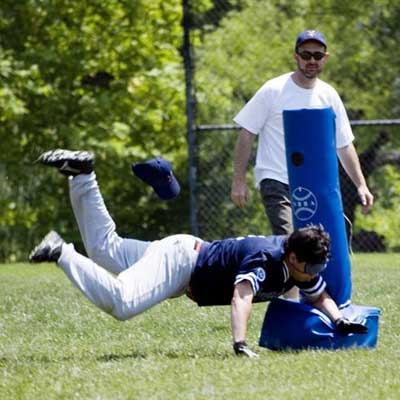As a Little League coach, I’m constantly encouraging my kids to keep their eye on the ball. For athletes playing for the Boston Renegades, it wouldn’t make much difference – they are all legally blind.

The Boston Renegades are sponsored by the Association of Blind Citizens, and play a sport called Beep Ball. Since the athletes are without sight, the rules are different than traditional baseball. For starters, there are buzzing bases and beeping baseballs.
There are just two bases – first and third. Each is a padded cylinder 100 feet from home plate. The bases contain sounding units that give off a buzzing sound when activated. The batters do not know which one will be activated until they hit the ball. Then, they must identify the correctly buzzing base and run to it before the beeping ball is fielded by a defensive player. If the ball is fielded cleanly before the runner reaches the base, he’s out. Otherwise, it is a run.
Rob Weissman (Waltham, MA, 42) joined the Renegades as Head Coach a decade ago, and has been working with people with disabilities since college. Since he has sight, he also does the catching for the team. He explained some of the unique aspects of the sport.
“From a game standpoint, one of the main differences is that you gotta be quiet. When someone hits a ball, you can’t cheer and scream – and that is not natural for somebody. You need to be dead silent so the batter can hear the base, and the player can hear the ball. That’s about the biggest difference between the two games that you’d see as a sighted person.”
At the plate, batters are blindfolded and get 4 strikes, and there are no walks. Batters are pitched to by one of their own sighted teammates. The ball is 16 inches in circumference, about the same size as a slowpitch softball. As the ball is being released, the pitcher says ‘Ready… Pitch’ to give the batter a chance to swing. A ball must be hit 40 feet to be a fair ball.
On the diamond, fielders are coached by sighted spotters who convey a number to them based on where the ball is hit. For instance, a ‘four’ call means the middle player will move laterally right while the third baseman will move laterally left.


Rob commented on his role as a coach: “From a coaching standpoint, it really challenges your communication skills. One thing I learned really early on is that you don’t need to yell to be heard since the field is so silent. You can just talk at a normal level and they can hear you across the field.”
I asked Rob if there were different levels of vision loss for different players, and whether that caused a competitive advantage for some.
“You are always suspect when you see guys with giant Coke bottle lenses and they are walking around just like you and I would be, but when you go under the blindfold, everybody is on the same playing field. The blindfold is the great equalizer.”
I was surprised to learn that many Renegade players were not blind most of their lives, and that several were excellent athletes who had played varsity baseball before losing their vision.
Tim Syphers (Watertown, MA, 24) played ball for Watertown High School, and 2013 marks his rookie season with the Renegades. Tim was a client at the Carroll Center for the Blind in Newton when one of the coaches of the team invited him to workout with the team. Tim explained how loss of his sight impacted his involvement in sports.
“I remember one of the times before I knew I was legally blind, I was throwing a football around with a buddy and I couldn’t catch the darned ball. It was depressing. It was sad. I just thought I needed glasses. When I found out I was legally blind, I thought sports were gone forever. When I met Rob, it was like a weight had been lifted. Something physical was back in my life.”
Joey “Wrong Way” Buizon, (Somerville, MA, 30) lost his vision when he was 17 shortly after playing for Somerville High School. Initially, doctors thought he had Leber’s Hereditary Optic Neuropathy, which causes sudden onset of unilateral painless blurry vision, followed within two months by the same symptoms in the other eye. To this day, doctors aren’t exactly sure what his affliction is, but his nickname proves he hasn’t lost his sense of humor about it.
“In Beep Ball, when one of the bases go off, you really don’t know which one – that is one of the challenges of the sport to keep it competitive. So one time, when the bases went off, I went to first base, but really, the other base was going off. I went all the way down the wrong line. From then on, they’ve called me ‘Wrong Way.’”
Joe McCormick (Melrose, MA, 20) first heard about the team from Wrong Way while interning at the Massachusetts Commission for the Blind. Joe played ball through Little League, and played varsity soccer in high school. He lost his sight three years ago, gradually, over the course of a year.
“I was a senior at Malden Catholic and one day was in our robotics lab and went to look through a PVC pipe. When I went to look through, I thought there was a cap on the end. But there was no cap.” Joe continued: “I found out it was a disease called Leber’s, and basically they said I had days to weeks to months before I’d loose vision in my other eye.” Joe lost vision in his second during graduation week of high school.
“My initial fears were loss of independence, and not being able to drive. I love driving. But sports was also a big thing. I was so used to like going out after school playing Frisbee or pickup basketball. After finding the Renegades, I knew this game was for me. I could compete at the same level as everybody else.”
From a competitive standpoint, Joe even finds beepball even more thrilling than traditional baseball.
“Every play is a scoring play. In baseball, you hit a single, someone can score on an RBI, but you’re not gonna be able to score on that play. But in beepball, if you hit a ball in the field, you can score on that play. So it makes it way more exciting. Once you dive into the base and make contact with it you hear the umpire yell safe ‘safe’ it just you are just filled with energy and passion for the game.”
Aqil Sajjad (Cambridge, MA, 33) is originally from Pakistan, but is currently a student at Harvard, who has played with the Renegades for four years. Aqil was 10 when he had retinal detachment in his first eye, and 16 when it hit his other eye. Back in Pakistan, he had mainly played cricket.
“For a while I didn’t play any sport. This is the first time I’ve played a sport since losing my eyesight. People had introduced me to blind cricket, but it was so different from sighted cricket that I just said ‘Forget it. I’m not gonna play this.’ When I started playing this game, that was when I prepared myself that it would be different than sighted baseball.”
And a different game it is.
“Apart from the fact that the ball beeps, the pitcher is on the same team as the batting side. The pitcher is sighted and tries to put the ball in the exactly in same spot. Your goal is to swing your bat exactly in the same spot with exactly the same timing. It’s about muscle memory and consistency of your swing. At home you swing, swing, and swing so that you have that muscle memory on the field. This is different from sighted baseball where you are looking for the ball with your eye and the pitcher is trying to get you to miss the ball. Here, the pitcher and you work together.”
Beginning July 30, the Renegades will attend their 12th consecutive Beep Baseball World Series in Columbus, Georgia. If you would like to join the Renegades as a player or volunteer, visit the Boston Renegades for more details.
Brett Rudy, author of this article, gives Beep Baseball a try.
Brett Rudy is a trailblazer in the world of baseball. As the founder of Baseball Is My Life and co-founder of Charity Hop Sports Marketing, he’s dedicated to elevating the sport and supporting the athletes who play it. With a passion for making a difference, Brett has created successful philanthropic initiatives like Charity Wines and 100 Innings of Baseball for ALS. He’s also the mastermind behind the Corked Bat Collection, Cooperstown Classic at the Baseball Hall of Fame, and Winterball for Toys for Tots. When he’s not working to improve the game, Brett can be found playing outfield in the Boston Metro Baseball League, living and breathing the sport he loves.